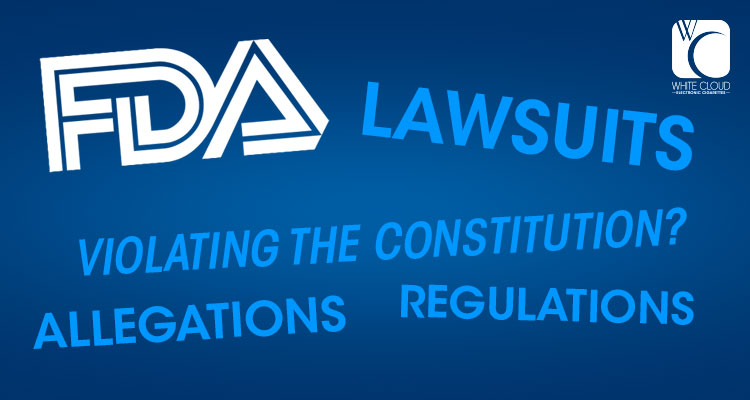The FDA’s decision to start regulating e-cigarettes as tobacco products has unsurprisingly opened the floodgate for lawsuits. E-cig companies, e-cig users, lawmaker and even some tobacco companies are challenging the FDA’s new regulations for vapor products for violating the Constitution and several federal laws. How is the FDA responding to these allegations?
So far, they have been suspiciously quiet, ignoring two letters from congressman Ron Johnson requesting that the FDA revise its rules in light of scientific evidence suggesting vaping is significantly safer than smoking. As they stand, the Deeming Regulations could obliterate the vaping industry by placing undue financial burdens on makers of e-cigs. Ironically, people who have switched from smoking to vaping may be forced to pick up tobacco again to get their nicotine fix.
Lawsuits Piling Up Against FDA Deeming Regulations

The legal arguments against the Deeming Regulations are numerous, but they all center around two issues: pre-market approval and warning labels. According to the new regulations, all e-cigs and e-liquids made after 2007 will now be subject to approval from the FDA, which means e-cig companies must pay hefty fees to the federal government on top of having to fund research on their products.
Opponents argue that these rules are arbitrary, and they place an unfair burden on smaller e-cig companies while giving an advantage to tobacco companies. The new required warning labels for e-cigs, which are similar to the ones found on tobacco products, are also being challenged for their arbitrary nature and for infringing on the Constitutional right to free speech. Below is a sampling of the lawsuits currently facing the FDA.
- Nicopure Labs, a company that makes e-liquids, has accused the FDA of violating the Administrative Procedure Act, or APA, which prohibits federal agencies from making “arbitrary and capricious” rules.
- Lost Art Liquids has sued the FDA for violating the Regulatory Flexibility Act, or RFA, by unfairly targeting small businesses with their new rules. They also claim that the Deeming Regulations violate the APA, as well as that First and Fifth Amendments to the U.S. Constitution.
- John Middleton Co., maker of “Black & Mild” cigars, has sued the FDA on First Amendment grounds because the new regulations forbid companies from using the word “mild” in their marketing.
- Global Premium Cigars has also accused the FDA of violating their First Amendment rights because the new warning labels detract from the trademarks on their packaging.
- Several vaping advocacy groups led by the Right To Be Smoke-Free Coalition have joined a lawsuit against the FDA claiming the Deeming Regulations violate the APA, the RFA and the Constitution.
- Congressman Larry W. Faircloth of West Virginia has filed suit against the FDA for violating the Tenth Amendment, which limits the authority of the federal government.
U.S. Senator Demands Answers From FDA
Other lawmakers are also standing up against the FDA. Senator Ron Johnson of Wisconsin, who has been a major advocate for e-cigs and tobacco harm reduction, penned a letter to the FDA on May 17, 2016 to voice his constituents’ concerns over the Deeming Regulations.
“A large number of individuals have contacted my office to tell their stories about how they use or have used e-cigarettes to quit smoking,” Johnson stated in the letter. He expressed fear that the new rules could have a negative effect on public health by restricting access to e-cigs and therefore driving vapers back to smoking. Johnson also told the FDA that many small manufacturers and retailers are afraid that the new regulations could “force them out of business.”
After waiting several weeks for a response, Johnson sent another letter to the FDA on June 6 requesting feedback by June 20, 2016. That day came and went; yet the FDA remains silent.
Related: Political Leaders Showing Support for Vaping
The Vaping Community’s Response to the FDA’s Final Ruling
Outrage from the vaping community was to be expected, but many tobacco control experts and public health researchers have also been critical of the Deeming Regulations. Here is a roundup of the FDA’s most outspoken critics:
- Boston University School of Public Health professor Dr. Michael Siegel called the regulations “a disaster for public health” because they favor actual tobacco products over safer nicotine alternatives like e-cigs.
- The Smoke-Free Alternatives Trade Association, or SFATA, issued a statement saying the FDA’s attempt to regulate e-cigs, “pulls the rug out from the nine million smokers who have switched to vaping.”
- The Consumer Advocates for Smoke-Free Alternatives, or CASAA, echoed the same concerns in their response to the Deeming Regulations claiming, “the FDA has demonstrated a clear lack of regard for the most recent scientific evidence and advice from public health professionals.”
- American Vaping Association president Gregory Conley called the new FDA regulation, “a big win for America’s favorite cigarette companies,” and “a giant loss for thousands of small businesses.”
- Jeff Stier of the National Center for Public Policy Research said the Deeming Regulations, “give deadly old-school combustible cigarettes an almost insurmountable competitive advantage” over e-cigs.
The FDA can ignore public outcry, but it can’t avoid the courtroom. The FDA will eventually be forced to answer critics of the Deeming Regulations one way or another.






